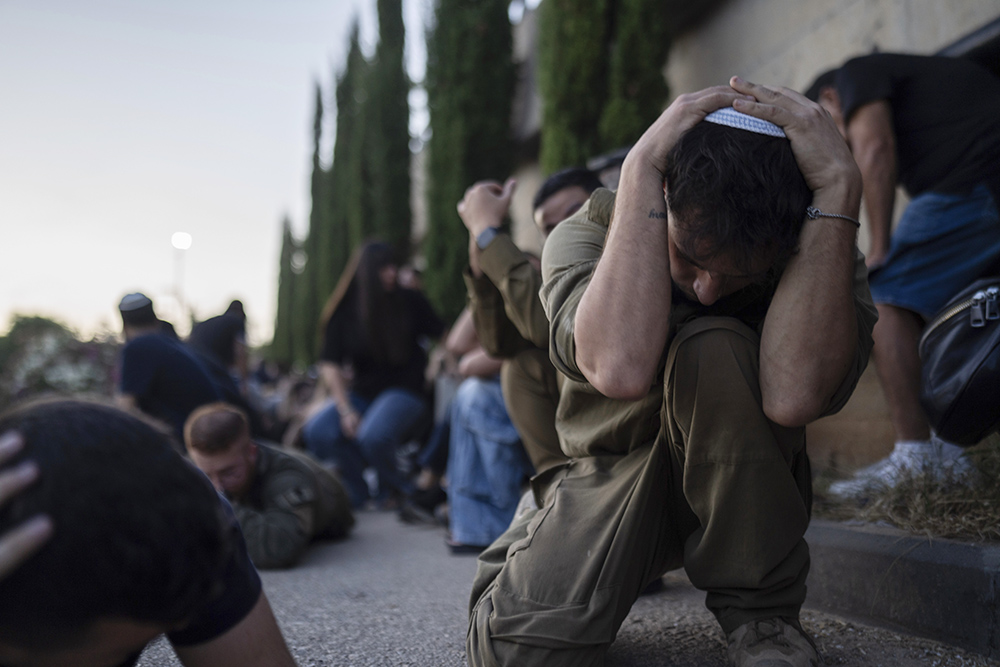
At a cemetery in Holon, central Israel, Oct. 26, Israelis take cover as a siren warns of incoming rockets fired from the Gaza Strip, during the funeral of Israeli man Sagiv Ben Svi, killed by Hamas militants while attending a music festival on Oct. 7. (AP/Petros Giannakouris)
The attempts to arrive at a moral calculus on the Israel-Hamas war that would calm the conscience, meet the "rules of war" requirements, and satisfy the demands for justice all around are, at once, as clear as the outrage over slaughtered civilians, including babies, and as muddy as a history shaped by decades of unceasing violence and distrust.
Such attempts are as conflicted and wrought with irreconcilables as the ancient landscape now tortured anew. There seems no clear way through the thicket of raw violence, Hamas' written wish for the annihilation of Israel, Palestinians' legitimate demands for security and self-determination, and Israel's precarity as a lone, functioning democracy surrounded by enemies in a region too often near the point of exploding.
Christians, and particularly Catholics, should approach the question of moral compass amid the horrific violence with a hefty dose of humility, if not justifiable guilt, following centuries of religious antisemitism that was a major ingredient in the state antisemitism that resulted in the Shoah. This is the history that Jews under siege in Israel and elsewhere want us to remember. Catholics might also approach this fraught moment with a hope born of our own experience — a transformation of our difficult relationship with Jews in the modern era.
Nor were we very good at understanding or tolerating the Islamic faith and its various cultures. Perhaps it is that ancient history and certainly more recent events that contemporary Muslims wish we would recall.
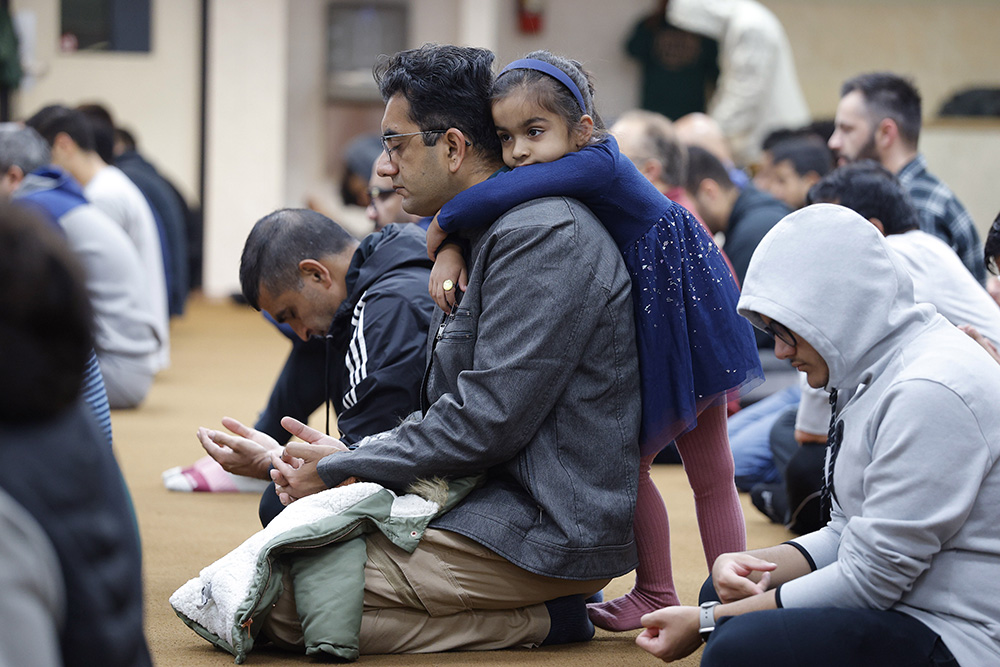
Yasir Nawaz's daughter, Amal, 4, clings to him during Friday prayers Oct. 13 at the Islamic Center of East Lansing in Michigan. (AP/Al Goldis)
Repeatedly after the Hamas attacks on civilians and the bombing of Gaza neighborhoods by Israel, Palestinians in the United States and their allies here begged news outlets to include the decades of suffering experienced by Palestinians as part of the context in reporting events.
What standards, what demands, might the Christian/Catholic world place on either side? What magnanimity would we demand of the aggrieved on either side? If we are left with inadequate words, much less useful advice, perhaps in the silence we might seek, at a minimum, to understand.
In Sacred Landscape: The Buried History of the Holy Land Since 1948, Meron Benvenisti's 2002 memoir of the beginning of the state of Israel, he recalls accompanying his father, a geographer and cartographer, on excursions prior to 1948 to rename Arab locations with Hebrew names.
Apparently, there was little Arab resistance until it was too late. His father's map "triumphed, and I, his dutiful son, was left with the heavy burden of the fruits of victory. The victory was so overwhelming that it utterly destroyed my childhood landscape and my sense of loss was mixed with pride in my people's triumph."
The map became reality following the overwhelming Israeli victory in the 1948 war.
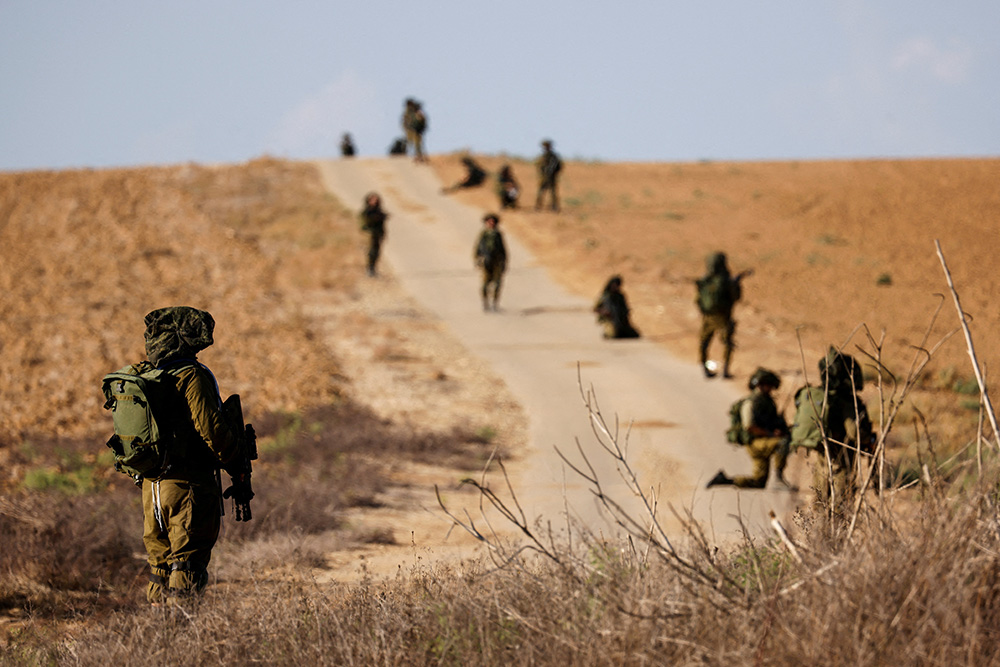
Israeli soldiers patrol an area near Israel's border with the Gaza Strip in southern Israel Oct. 19. (OSV News/Reuters/Amir Cohen)
Benvenisti, who died in 2020, was a political scientist and writer who served as deputy mayor of Jerusalem from 1971 to 1978. In Sacred Landscape, he describes as a massacre what occurred in 1948 in Deir Yassin, a Palestinian village on the outskirts of Jerusalem. That attack by Jewish militia, he wrote, "deserves to be characterized as ethnic cleansing of the cruelest and most brutal sort."
He acknowledges guilt for what Palestinians experienced at the time. And yet, he wrote, "I refuse to take more than my share of this responsibility and certainly cannot accept the contention that my birth in this land was an imperialist sin. No attempt to manipulate my sense of guilt will succeed in shaking my belief in my birthright in this land."
Benvenisti is hardly a spokesman for an entire people, but the tensions he articulated and understood are widely experienced among Jews in Israel in ways more forthright and frankly expressed than can be found, for instance, in any mainstream U.S. publications. This matter of Israel and Palestine has been, it is safe to say, unsettled territory from the outset, however one might calculate that point.
Today we have, in video form not available at the time of the massacre Benvenisti describes, another massacre of unspeakable cruelty, intent and viciousness. The Hamas slaughter of innocents has the aura of extermination about it.
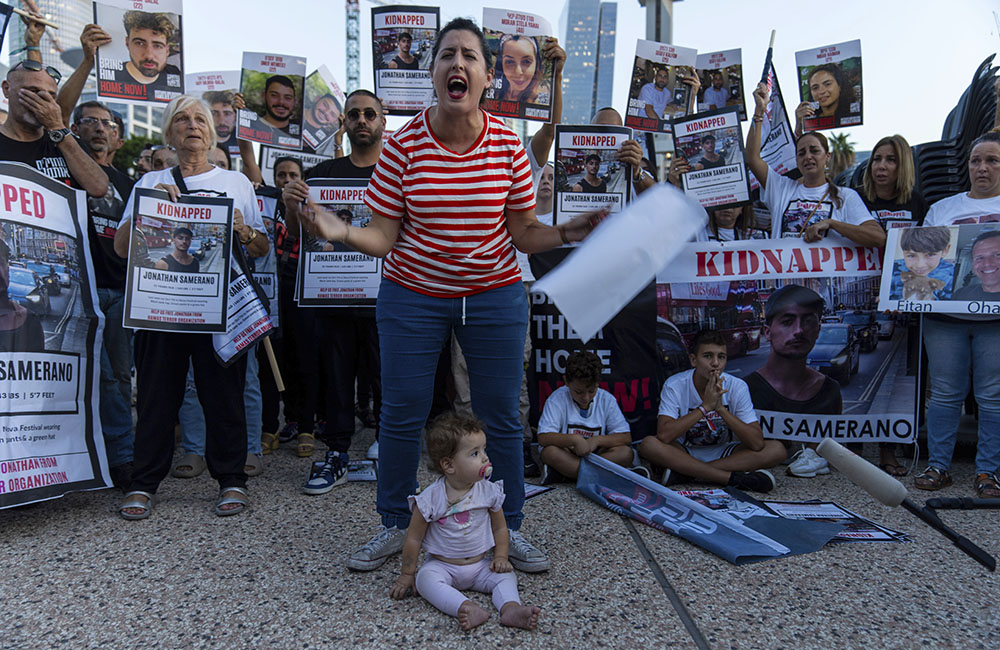
Relatives of people kidnapped by Hamas militants hold the pictures of their loved ones during a protest calling for their return, in Tel Aviv, Israel, Oct. 26. (AP/Ohad Zwigenberg)
Novelist Dara Horn wrote a piercing description of the litany of horrors evoked by the Hamas attack, horrors from ancient times to the present that shape the Jewish understanding of themselves and the world and against which a hope born of faith is tested.
In a similar way, reported The New York Times, "the escalating airstrikes and humanitarian crisis unfolding in the Gaza Strip stirred common strains of anger, sorrow and grievance at Muslim prayer services across the country."
Israel's understandable ambition to wipe out Hamas contains its own unthinkables: the growing tally of Palestinian civilians, women and children especially, victims of relentless bombing, inside a virtual prison with no way out. Why indeed, as the imams in the U.S. ask, are Palestinian women and children paying the extreme price?
And so goes the wearisome effort at gaining some zero-sum advantage, the endless toggling back and forth between horrors and historic pain of each side that seem irreconcilable.
Perhaps the pragmatic conclusion of the current moment, teetering on the precipice of all-out war, will be that Israelis and Palestinians — and by extension the wider region — come to understand they've reached their own moment of mutually assured destruction. Could it be that the sanest on all sides will decide not to take the last, provocative step?
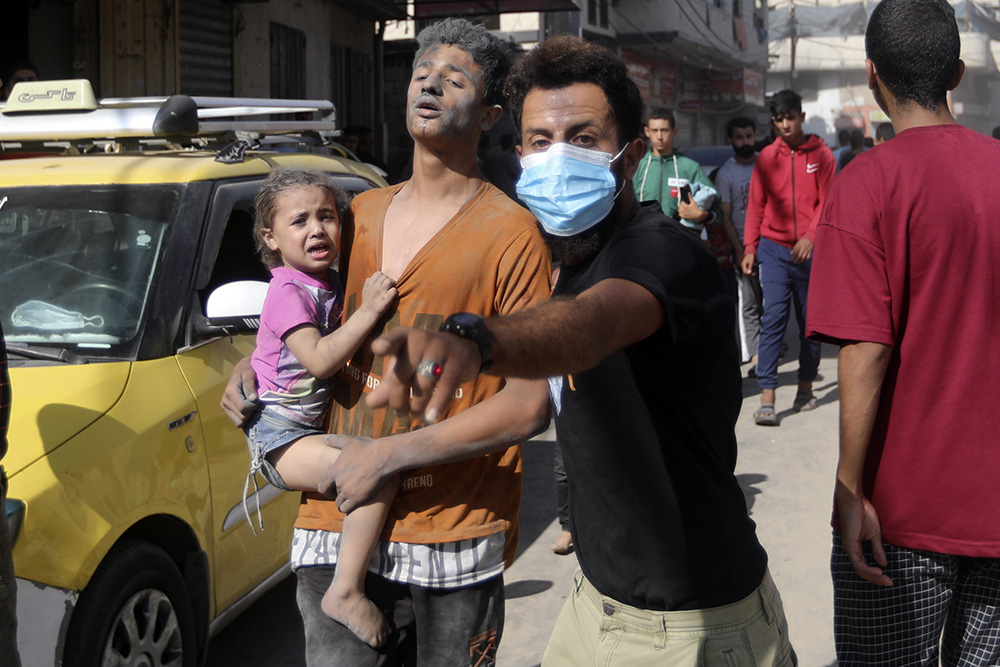
Injured Palestinians are evacuated following Israeli airstrikes on the town of Khan Younis, southern Gaza Strip, Oct. 26. (AP/Mohammed Dahman)
There will be a military conclusion. No matter who wins and who is humiliated, whether Hamas is eliminated, the long-term enmity and its causes will not be resolved.
Which leaves the rest of us in a very tense limbo while searching for moral certitude, or at least for some way to think about this conflict.
We know that people of many religious stripes, Catholics included, are involved in various ways on every side of the current dispute. Maybe that's where we should be, on every side, not to exacerbate or further inflame but to do what we can to tamp down the ancient hatreds and the inclinations to violence.
No better example exists than Tantur Ecumenical Institute, affiliated with the University of Notre Dame and long a place of interfaith and ecumenical activity.
Jesuit Fr. John Paul directs the institute, which lies between Bethlehem and Jerusalem. He recently described the region as "an area filled with religious spiritualities. I wake up every day hearing the Muslim call to prayer, five times a day. I hear and see around me the Shabbat hymns that call people to the beginning or end of Shabbat. I see people dressed in a wide variety of traditional Jewish clothing. I hear church bells that ring here all the time."
Advertisement
His vision of peace, Paul said, is "people going back into their Scriptures and really studying and listening carefully. What does it mean to live what the Gospel, the Quran, the Hebrew Scriptures are calling us to? How do we care for the orphans, the widows, the strangers? How do we care for and really live with the sense that we are all created in the image and the likeness of God?"
He is amid it all, in a sense on all sides. He knows, in a way most of us cannot, the deep trauma of living in constant fear, the situation increasingly for both Israelis and Palestinians.
The tensions and fear do not respect borders. We've seen already the anger and frustration play out in our streets, in gatherings of American Jews opposing Israel's response in the nation's capital, in the anguish being lived out in mosque and synagogue, in the search in our institutions of higher education for the correct positioning and language to explain sympathies for one side or the other.
The question is, can the spirit of a Tantur spill beyond the borders, somehow influence our thinking and acting here?
The search for our moral bearings in all of this may lie not so much in constructing a conclusive statement of right and wrong. It may, instead, lie in encounter and, as Pope Francis puts it, in accompaniment.
While we may not be able to directly affect matters in the Middle East, we should persuade our religious leaders here to gather those on all sides who are willing, while hurting and even grieving, to come together in our common humanity. To pray. To talk. To perhaps take a tentative step toward peace.






